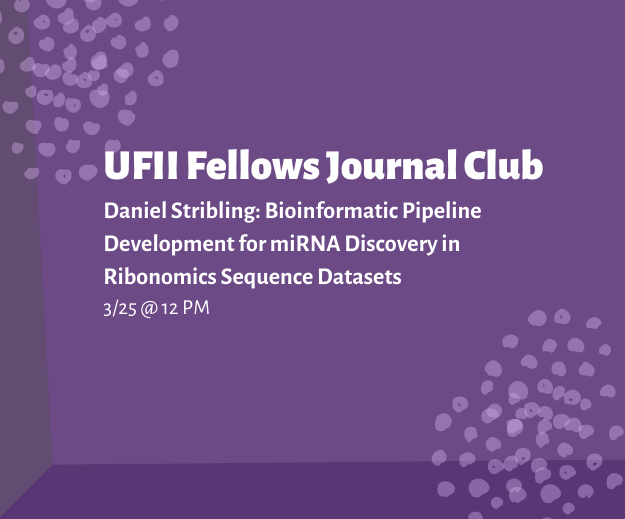UFII Fellows Journal Club Virtual Seminar – Daniel Stribling

- This event has passed.
UFII Fellows Journal Club Virtual Seminar – Daniel Stribling
March 25, 2021 @ 12:00 pm - 1:00 pm

UFII Fellows Journal Club Virtual Seminar Series
“Bioinformatic Pipeline Development for miRNA Discovery in Ribonomics Sequence Datasets”
by Daniel Stribling
MD-PhD Scholar in the Rolf Renne Lab, Department of Molecular Genetics and Microbiology
Thursday, March 25, 2021
ABSTRACT:
New high-throughput experimental genomics methods target RNA-binding proteins to generate expansive RNA-sequence datasets studying the RNA regulatory interactome. In addition to RNA-target interactions, these ribonomics datasets also provide a significant untapped potential for discovery of novel regulatory function in known RNA sequences that is limited by a lack of data analysis methodology. We designed the Target-Oriented microRNA Discovery (TOMiD) analysis technique to allow discovery of regulatory microRNA molecules (miRNAs) from existing ribonomics datasets, such as those obtained by the novel Quick Crosslinking and Sequencing of Hybrids (qCLASH) method. An early version of this method has been successfully utilized to discover a novel human miRNA associated with several types of cancer. This seminar will discuss the initial TOMiD method development and early implementation, initial findings using the method, and ongoing reimplementation and expansion of the technique into an open-source software package built on the Nextflow programming language.
Bio:
Dan Stribling is a MD-PhD Scholar in the UF Genetics & Genomics Graduate Program in the lab of Rolf Renne. With the Renne Lab, Dan studies the regulatory role of noncoding RNA in oncogenic gammaherpesviruses such as the cancer-causing Kaposi’s Sarcoma-Associated Herpesvirus (KSHV), with a primary focus of development of novel computational methods for discovery in noncoding RNA research. Dan previously studied at Florida State University in the topics of Chemistry and Computational Biology, and aspires to apply novel bioinformatics and machine learning methods to study the genomic basis of human cancer.


